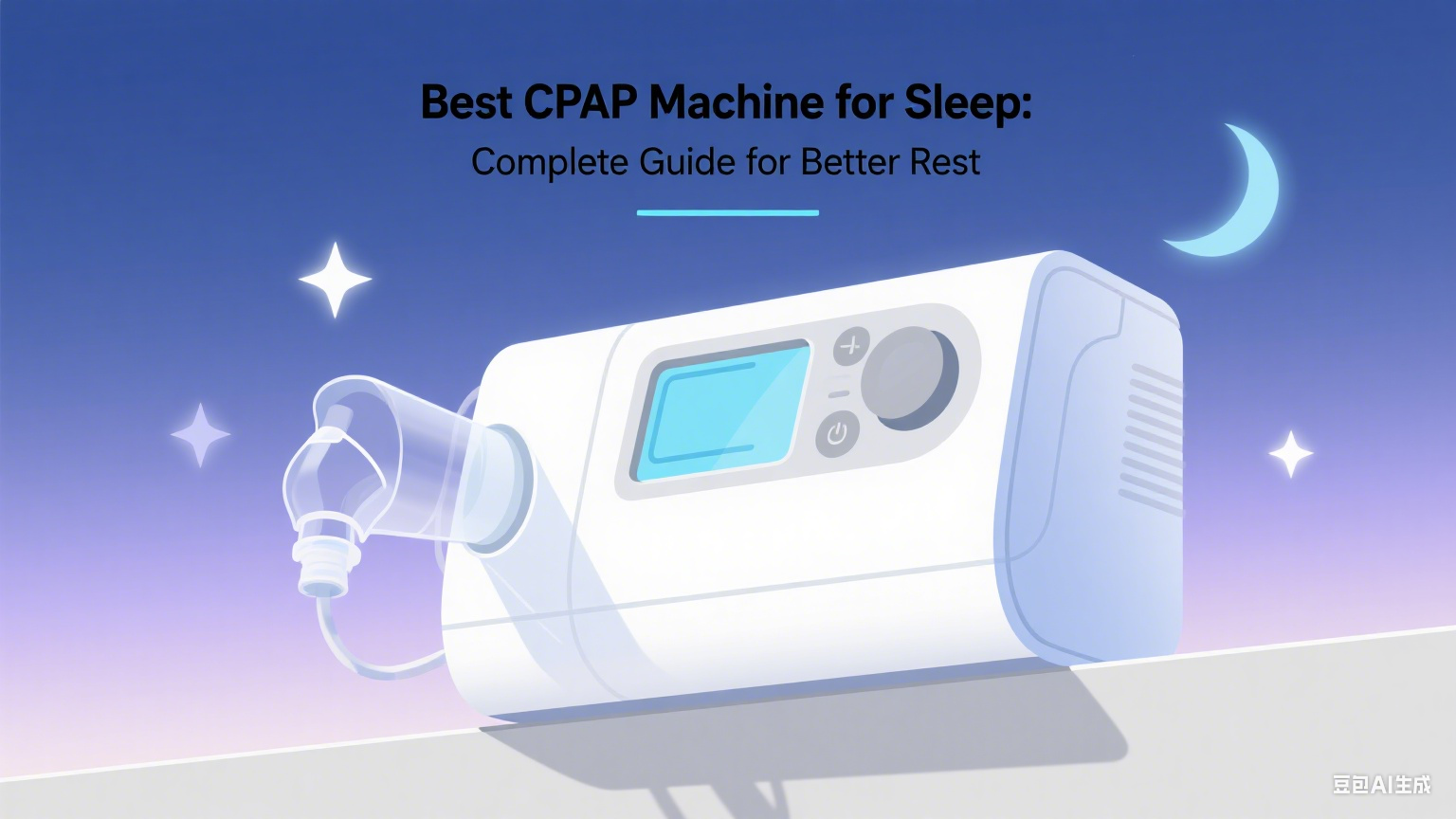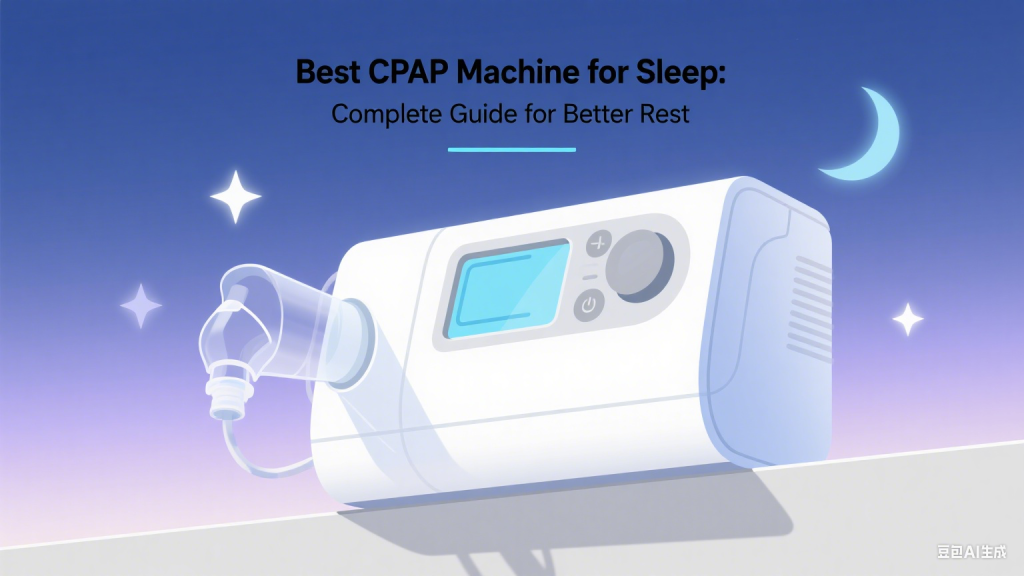Best CPAP Machine for Sleep: Complete Guide for Better Rest


Introduction to CPAP Machines and Sleep Health
Sleep is one of the most important pillars of overall health. Yet, millions of people struggle with disorders like sleep apnea, which disrupt deep rest and cause long-term health risks. For many, a CPAP machine for sleep is the gold-standard treatment, ensuring better breathing, steady oxygen levels, and truly restorative sleep.
This guide dives deep into what CPAP machines are, how they work, their benefits, potential side effects, and how to choose the best one for your unique needs. Whether you’re newly diagnosed with sleep apnea or exploring solutions for better rest, this article provides everything you need to know.
What Is a CPAP Machine?
A CPAP machine (Continuous Positive Airway Pressure) is a medical device designed to keep your airway open while you sleep. It delivers a steady stream of pressurized air through a mask, preventing airway collapse—a common cause of obstructive sleep apnea (OSA).
How CPAP Therapy Works
When you sleep, muscles in your throat can relax too much, causing blockages in airflow. This leads to pauses in breathing, snoring, and fragmented sleep. CPAP therapy gently pushes air into your throat, keeping it open and allowing for uninterrupted breathing.
Key Components of a CPAP Machine
- Machine Unit – Generates airflow.
- Tubing – Connects the device to the mask.
- Mask – Worn over the nose, mouth, or both.
- Humidifier (optional) – Prevents dryness and irritation.
- Filters – Keep air clean and free from dust.
Common Sleep Disorders Treated with CPAP
Not all sleep problems require CPAP, but for certain conditions, it is the most effective treatment.
Obstructive Sleep Apnea (OSA)
OSA is the most common form of sleep apnea. It occurs when throat muscles collapse, blocking airflow. CPAP therapy keeps the airway open and prevents these interruptions.
Central Sleep Apnea
Unlike OSA, central sleep apnea happens when the brain fails to send proper signals to breathing muscles. CPAP can help in some cases but may require more advanced machines like BiPAP.
Complex Sleep Apnea Syndrome
This is a mix of obstructive and central sleep apnea, where CPAP is often the first treatment but may need adjustments.
Benefits of Using a CPAP Machine for Sleep
Improved Breathing and Oxygen Flow
Continuous airflow ensures oxygen reaches your lungs without interruption.
Reduced Daytime Fatigue
Better sleep means improved focus, mood, and productivity.
Lower Risk of Heart Disease and Stroke
Untreated sleep apnea increases risks of hypertension, arrhythmias, and cardiovascular disease. CPAP reduces these dangers significantly.
Choosing the Right CPAP Machine for Sleep
Selecting the right CPAP machine for sleep can feel overwhelming, especially with so many models on the market. However, understanding the types, features, and mask options can help you make an informed decision.
Types of CPAP Machines (Standard, Auto, BiPAP)
- Standard CPAP – Provides a fixed air pressure throughout the night. Ideal for patients with consistent pressure needs.
- Auto CPAP (APAP) – Adjusts pressure automatically based on your breathing patterns. Offers more comfort and flexibility.
- BiPAP (Bilevel Positive Airway Pressure) – Delivers two pressure levels: one for inhalation and a lower one for exhalation. Typically prescribed for people who cannot tolerate standard CPAP.
Features to Look For
When buying a CPAP machine, consider:
- Adjustable Pressure Settings – Allows customization based on your needs.
- Humidifier – Reduces dryness and irritation.
- Ramp Function – Starts with a lower pressure and gradually increases, making it easier to fall asleep.
- Noise Level – Quieter machines promote better sleep for both you and your partner.
- Data Tracking – Some models record sleep data and connect to apps for progress monitoring.
Best CPAP Masks for Comfort
- Nasal Mask – Covers only the nose; best for mild to moderate sleep apnea.
- Full Face Mask – Covers nose and mouth; ideal for mouth-breathers.
- Nasal Pillow Mask – Minimal design that fits at the nostrils; great for those who feel claustrophobic.
Step-by-Step Guide to Using a CPAP Machine
Getting used to CPAP therapy may take time, but following the right setup ensures maximum comfort and effectiveness.
Setting Up Your Machine
- Place the device on a flat surface near your bed.
- Fill the humidifier chamber with distilled water if included.
- Connect tubing securely to the machine and mask.
- Plug in the device and power it on.
Adjusting Pressure Settings
Your sleep specialist will recommend the best pressure range. For auto-adjusting machines, settings adapt automatically. Make sure you never change prescribed settings without consulting your doctor.
Cleaning and Maintenance Tips
- Wash the mask and tubing daily with mild soap.
- Replace filters as recommended (usually every 2–4 weeks).
- Clean the humidifier chamber to prevent mold buildup.
Side Effects and Challenges of CPAP Therapy
While CPAP therapy is highly effective, some users experience initial discomfort.
Common Problems
- Dry Mouth and Nose – Often caused by lack of humidity.
- Mask Leaks – Can reduce effectiveness and cause skin irritation.
- Claustrophobia – Some people feel anxious wearing a mask.
Solutions and Adjustments
- Use a heated humidifier to prevent dryness.
- Try different mask sizes and styles for a better fit.
- Practice wearing the mask during the day to get used to it.
- Adjust straps gently to avoid skin marks.
Tips to Improve Sleep Quality with CPAP Machines
CPAP works best when combined with healthy sleep habits.
Establishing a Nightly Routine
- Go to bed at the same time daily.
- Avoid caffeine and heavy meals before sleep.
- Use your CPAP machine every night—even during naps.
Combining CPAP with Good Sleep Hygiene
- Keep your bedroom dark and cool.
- Limit screen time before bed.
- Exercise regularly, but not too close to bedtime.
Cost, Insurance, and Accessibility
Average Price of CPAP Machines
CPAP machines can range from $500 to $2,000, depending on features and brand. Masks and accessories are usually sold separately.
Insurance Coverage and Reimbursement
Most insurance companies, including Medicare, cover part or all of the cost of a CPAP machine when prescribed by a doctor. It’s important to check your provider’s requirements.
Latest Innovations in CPAP Technology
Technology has made CPAP machines more user-friendly and effective.
Smart CPAP Devices and Mobile Apps
Modern CPAP machines often include Bluetooth connectivity, allowing users to track sleep data via mobile apps. This helps patients and doctors monitor progress.
Noise Reduction and Comfort Enhancements
Today’s machines are smaller, quieter, and designed with ergonomic masks that reduce pressure marks and discomfort.
Comparing CPAP Machines vs. Alternatives
CPAP isn’t the only treatment option, though it is the most common.
Oral Appliances
Custom dental devices reposition the jaw and tongue to keep the airway open. Best for mild cases of sleep apnea.
Surgery and Lifestyle Changes
Surgical procedures like UPPP (uvulopalatopharyngoplasty) or lifestyle changes such as weight loss and avoiding alcohol before bedtime can reduce symptoms.
Expert Recommendations and Safety Guidelines
- Always consult a sleep specialist before starting CPAP therapy.
- Replace masks and filters regularly for hygiene.
- Never stop using CPAP without medical advice, as untreated apnea can be life-threatening.
Frequently Asked Questions (FAQs)
Q1. How long does it take to adjust to a CPAP machine?
Most people adjust within 2–4 weeks. Gradually increasing usage helps ease the transition.
Q2. Can I travel with my CPAP machine?
Yes, CPAP devices are portable and allowed on airplanes. Many come with travel-friendly cases.
Q3. How often should CPAP masks be replaced?
Every 3–6 months for best performance and hygiene.
Q4. What happens if I skip using my CPAP machine for a night?
Skipping can lead to poor sleep, fatigue, and increased health risks if it becomes a habit.
Q5. Do CPAP machines cure sleep apnea?
No, they manage symptoms effectively but don’t cure the condition. Consistent use is required.
Q6. Can children use CPAP machines?
Yes, but only under medical supervision. Pediatric sleep apnea requires specialized equipment.
Conclusion: Is a CPAP Machine Right for Your Sleep Needs?
A CPAP machine for sleep is a proven solution for managing sleep apnea and improving sleep quality. While it may take time to adjust, the long-term benefits—including reduced health risks, better rest, and improved daily performance—make it a worthwhile investment.
If you struggle with snoring, daytime fatigue, or have been diagnosed with sleep apnea, consult your healthcare provider about CPAP therapy. With the right machine, mask, and routine, you can enjoy deeper, healthier, and more restorative sleep.
🔗 External Resource: For more information, visit the American Sleep Apnea Association at sleepapnea.org.
















